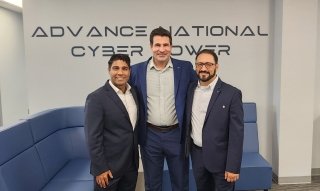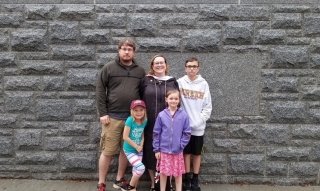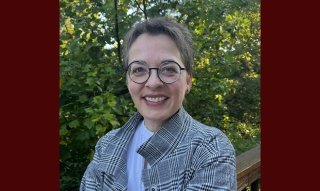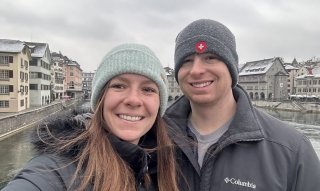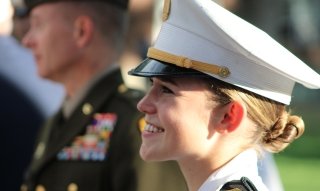Ralph M. Zecca, Jr.
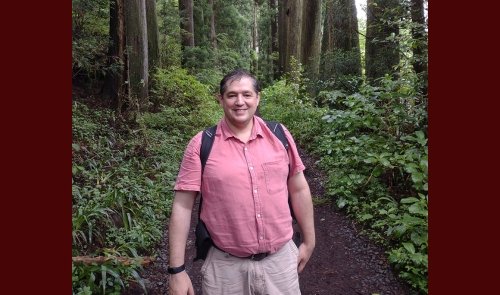
The program created an environment that allowed for honest academic exchange and debate. It forced you to know your material and know it well.
Q: “Tell us about yourself.”
A: “I love history, ever since I was a child. My mother bought me a set of graphic novels about American history that started with colonial history and ended in the Reagan era. I loved how history was a form of storytelling that brought the past to life and linked it to the present. So, with such a passion, I am generally reading history books in my spare time. As for other hobbies, I am a Scoutmaster with a local Scouts America troop where I enjoy working with young men as they learn how to become leaders. I am blessed to be married to my best friend, Akiko. She has been my rock and inspiration to go back to school. Together, we are the proud parents of two wonderful children. Our daughter, Caitlin, is a freshman at the College of William and Mary, where she studies psychology. She is also a Gold Award recipient with the Girl Scouts of America. Our son, Colin, is a sophomore in high school, where he is a part of their STEM program. He is currently preparing for his Eagle Scout project. So, Scouting is a family thing for us. Finally, I love cooking. I love watching cooking tutorials about how to make historical foods. I previously worked as an intelligence analyst for the Federal Government. I now work for the Coast Guard as the Chief of Staff for the Head of the Contracting Activity.”
Q: “What was your motivation for pursuing your degree?”
A: “I love history and always wanted to go further than a bachelor's degree. Not sure if I wanted to go for the doctorate, my wife encouraged me to jump back into academia and pursue my master's. She felt it would be an excellent test of my love of history and see if I wanted to go further. Along with my wife, my friend (and fellow Norwich alumnus) also encourages me. We share a love for history, and after he told me about his first year at Norwich, I knew I wanted to take that plunge into graduate studies, and I knew I wanted to do it at Norwich. And the rest was, as they say, history.”
Q: “Why did you choose Norwich?”
A: “For background, I already have two master's degrees from brick-and-mortar schools. I received my master’s in international peace and conflict resolution from American University in 2000. I then received another master’s in policy management from Georgetown University in 2014. In both instances, I attended class. So, Norwich University was my first online program, and it was awesome. I learned about Norwich University from my friend and colleague. We share a lot of the same interests and goals. And one day, he mentioned how he went back to school to get his master's in history. From there, I focused on the military history program at Norwich. I would argue that of my three graduate degrees, Norwich was truly my hardest and really made me a better researcher, writer, and scholar. Despite being online, the program created an environment that allowed for honest academic exchange and debate. In fact, I would argue the debates were better than my in-class experience because our debates were online and therefore written. This meant that you had to cite your sources in those responses! It forced you to know your material and know it well. With my Norwich degree, I plan to teach history as an adjunct in the future.”
Q: “Did you have any uncertainties with choosing an online program?”
A: “I was skeptical of online programs until I spoke with my friend. After hearing how interactive the program was and the rigor, my concerns subsided. After overcoming this concern, I found that the program's flexible schedule and cost were most beneficial for me. I assumed that the interaction with my classmates would have been less. However, I was quickly disabused of this misconception and found that the interaction between my fellow classmates was not only helpful but exciting.”
Q: What is one piece of advice you would give to future students enrolling in one of Norwich's online programs?”
A: “Balancing work, family, and school is hard. The best thing I can say is that it is best to enter the program with a plan. For example, I knew I enjoyed history related to the American Revolution. So, I focused my papers and research in each class (where permitted) to develop my area of expertise and better understand the literature related to my time period. So, I would argue, pick an area and then use that to build up an expertise in a particular period.”
Q: “What has been your biggest personal or professional success since starting your degree?”
A: “It may seem small to many, but when I walked into a used bookstore and went to the area that housed the books about the American Revolution, I quickly realized that I knew the names of many of them and could speak knowledgeably about either what school of thought the author belonged to or the premise of their book, I realized that I was more than an amateur historian.”
Q: “What aspects of your Norwich experience will you carry most strongly with you?”
A: “The Norwich experience made me a stronger writer. As a former analyst, I prided myself on my writing skills. I entered the program thinking that I was a decent writer. However, I realized that I had so much more to learn. I also strongly recommend the program for aspiring historians.”

